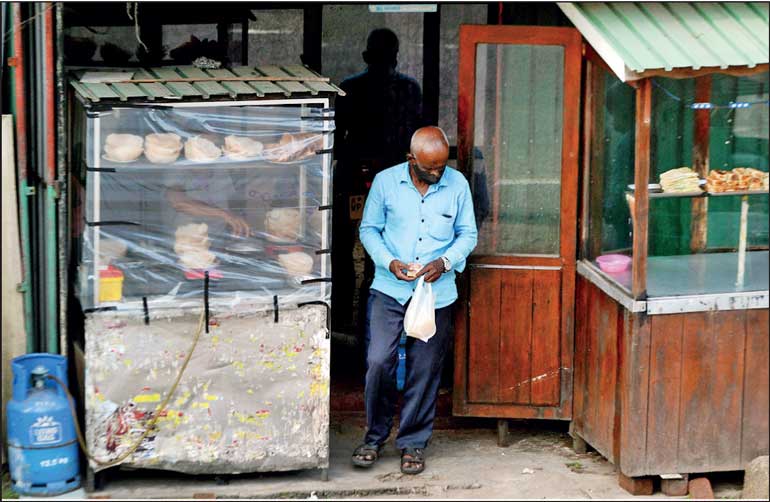Saturday Feb 14, 2026
Saturday Feb 14, 2026
Wednesday, 18 May 2022 00:24 - - {{hitsCtrl.values.hits}}

The last two decades have been a period where Sri Lanka went back many steps as a free and an open economy due to protectionism, import substitution, monopolisation, favoured tax policy and rogue infrastructure projects that were done without any business feasibility combined with lack of legal and technological reforms in many areas that could have avoided the current economic disaster.
open economy due to protectionism, import substitution, monopolisation, favoured tax policy and rogue infrastructure projects that were done without any business feasibility combined with lack of legal and technological reforms in many areas that could have avoided the current economic disaster.
Some tried to ridicule the free economy, others put the signal to the left and tried to go to the right creating space for extreme elements and protectionists to scuttle the correct reforms and investments to strengthen the macroeconomic environment of the country.
It is now time to bring political stability as a priority and establish a free market agenda as fast as possible to bring the much needed foreign exchange to the country.
A large number of individuals in the business community did not want the economic pie to grow with international capital and business activity but instead wanted to have more of the existing pie and indirectly killing the growth of the SME and the middle class and stifling the real economic expansions with partnerships in capital, equity, technology, and knowhow.
The sixth time Prime Minister Ranil Wickremesinghe and most members of the SJB are no strangers to the word “reforms”, but they have failed to get the necessary political will and support from a cross section of the society due to two key reasons. The first being the poor communication strategy from the reformist camp to the masses. Secondly the inability to get a clearer parliamentary majority in 2002, 2015 and even today. This opens the gates to destabilise anything, taking off the ground and sustaining for a considerable period to show the results of reforms in a free and fair market economy.
Nationalism is not only a political rhetoric, but a business and media tool too
Nationalism is not only a political slogan, but very much of a word used by the large corporate sector in Sri Lanka, specifically after the end of the war. They want protection from competition, they want transaction commissions instead of innovation and value addition. They want price fixing, and they don’t want foreign companies to be present on the island. As a result, Sri Lanka has seen very little FDI coming into the country since the end of the conflict, whereas if we had opened the doors for investors without political corruption and bribes and businessmen hiding behind politicians to monopolise industry and the services sector through deals, we would have been a different nation by now.
These actions have destroyed competition and the fundamentals of a free economy and the interest of investors for years. The local media also has been used heavily to do damage to the mindset of the people to give the wrong message to people on the free economy and how it works.
This economic crisis is the last bus for a long time
Since the tsunami of 2004 we have missed many buses to say the least due to lack of consistent policy and corrupt leadership in many forums. This time around we have another opportunity to get into the last bus for a long time and do a tough ride to get into a highway of speedy growth with major reforms.
We all know how the ECT was scuttled, LRT, KV railway projects ware rudely taken out, missed the opportunities to get free money for the MCC infrastructure and land reforms, Singapore Free Trade Agreement, none action on the trade facilitation committee recommendations and the National Trade and National Export Strategy, liberalisation of the shipping economy, energy sector and customs reforms, etc.
Get the priorities right and fast track reforms
Getting international capital to develop infrastructure and to restructure loss-making State-owned enterprises is a vertical that needs to be addressed as one of the number one priorities after sorting out the current energy crisis. Privatisation of SriLankan Airlines will hopefully happen this time around. Next is a structural reform of the power and energy sector to break the mafias that does not allow the right decisions to be implemented.
In parallel, it is vital that economic zones be established through private sector involvement along with the Board of Investment (BOI) and to empower the Export Development Board (EDB) to restart the National Export Strategy with the necessary teeth to implement the already identified reforms.
With the pandemic, the brain drain is serious and severe as the youth have lost job opportunities since the economy has plunged to a stagnant status and the education system which had failed to deliver to the needs of the market demand, has pushed them to look at moving out of the country. We need to fix these education reforms by inviting international universities and skills building organisations to set up the South Asian Education Hub in Sri Lanka. The space for education in South Asia including Sri Lanka is enormous, if the countries in the region need to industrialise and be a part of the world economy from a mere 4% of the world’s GDP they need education reforms.
Dismantle monopolies and Government protection on private sector
Sri Lanka will not move forward if the Government keeps protecting both State monopolies and private sector monopolies in goods and services. It will only help a few to suck out the disposable income of the masses and keep the income gap growing in the country. Proper taxation policy and removal of protectionism is the only way forward at this crunch time, if the new prime minister and whoever forms the Government needs real change to happen in Sri Lanka. Just as the pain is hard on the masses, the punch on the people who are responsible for this economic calamity should be harder, therefore, protectionism should end and the legal reforms for anti-competitive behaviour to enhance competitiveness and transparency should be enacted without delay.
Make the hub regulations meaningful to link to the global supply chains
It is pointless talking of geographic location anymore, without allowing the right regulations and creating an environment to ease doing business as Sri Lanka has clearly failed to bring in a reform agenda for it to properly link to the global supply chains. If the Customs and ports are allowed to monopolise and at the same time the BOI and the EDB are not driven by enthusiastic reformists, the aspirations of becoming a global logistics hub will not take place and the ports around the country will not optimise connectivity benefits. If the privatised terminals are taken out of the equation, shipping, and logistics accounts for less than 1% of GDP.
Collectively with the terminals too they account for less than 3%, whereas it should be between 8%-10% if we are a true hub. We have drafted a Hub Regulation to attract investments but have failed to execute this law effectively to attract investments purely due to lack of political will and commitment from many who are supposed to drive it.
Simply it is time to get the act together and use this opportunity to turn a new page in the country’s history as we are moving towards the 75th anniversary of independence in months to come.